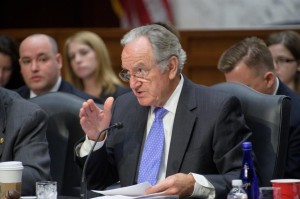
Sen. Tom Harkin, D-Iowa, released a report Wednesday contending that the impact of sequestration on domestic programs could be worse than the cuts to defense spending.
“So far we’ve heard a great deal about sequestration’s effects on Pentagon spending,” Harkin said at a hearing by the Labor, Health and Human Services, and Education Appropriations Subcommittee that he chairs. “But sequestration wouldn’t apply only to defense. It would also have destructive impacts on the whole array of programs that undergird the middle class in this country.”
An across-the-board sequestration, included in last year’s debt limit deal (PL 112-25), is slated to take effect in January unless Congress passes a larger agreement on spending and taxes. The White House estimates that cuts associated with sequestration will range between 8 and 9 percent, which would reduce funding for the Education Department by about $4 billion.
North Carolina’s Superintendent of Public Instruction June Atkinson testified to a Senate subcommittee Wednesday with a Texas school superintendent and others. Atkinson says 16 percent of North Carolina’s education budget comes from federal funding. She says the cuts would hurt reform efforts in five programs, affecting more than 200,000 students and potentially costing 600 jobs.
Senator Richard Shelby (R-AL) agreed that sequestration would have a detrimental impact and is not the way forward. But he asked panel members to take into consideration why they are faced with sequestration.
“We cannot forget how we got to this place in the first place,” Shelby said. “In the past few years, the federal government has been recording the largest budget deficits since 1945. Our nation cannot continue to spend money we don’t have.”
Source: CQ.com; News & Observer